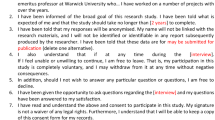Abstract
Six hundred three people completed a survey measuring perceptions of traditional areas of philosophical inquiry and their relationship to empirical science. The ten areas studied were: aesthetics, epistemology, ethics, history of philosophy, logic, metaphysics, philosophy of language, philosophy of mind, philosophy of science, and political philosophy. For each area, participants rated whether it is currently central to philosophy (centrality), whether its centrality depends on integration with science (dependence), and whether work in the area is sufficiently integrated with science (integration). Centrality judgments tended to be high. Participants viewed nine of the ten areas as central to philosophy (the exception being aesthetics), although they made this judgment more confidently for some areas. Dependence judgments were more varied, ranging from clear disagreement (for logic and history of philosophy) to clear agreement (for philosophies of science, mind, and language). Integration judgments were also varied but exhibited more uncertainty. Some areas whose centrality depended on integration were judged to be well integrated (philosophies of science and mind), but a central tendency for all other areas was ambivalence. Demographic factors had small but statistically significant effects on all three sorts of judgment. Higher age predicted higher centrality judgments and higher integration judgments. Higher socioeconomic status predicted lower dependence judgments and higher integration judgments. Men recorded higher integration judgments.

Similar content being viewed by others
Notes
For the integration scale, two participants recorded only nine responses. Initially I overlooked these two missing responses when inspecting the data set. Instead of recalculating all of the earlier statistics and analyses, I simply retained the data from these two participants.
References
Allison, P.D. 1999. Multiple regression: a primer. Thousand Oaks: Pine Forge Press.
Becher, T. 1981. Towards a definition of disciplinary cultures. Studies in Higher Education 6(2): 109–122. doi:10.1080/03075078112331379362.
Biglan, A. 1973. The characteristics of subject matter in different academic areas. Journal of Applied Psychology 57(3): 195–203.
Botts, T.F., L.K. Bright, M. Cherry, G. Mallarangeng, and Q. Spencer. 2014. What is the state of blacks in philosophy? Critical Philosophy of Race 2(2): 224–242. doi:10.1353/por.2014.0009.
Buckwalter, W., and S. Stich. 2014. Gender and philosophical intuition. In Experimental philosophy, 2nd ed, ed. J. Knobe and S. Nichols. Oxford: Oxford University Press.
Calhoun, C. 2009. The Undergraduate Pipeline Problem. Hypatia 24(2): 216–223. doi:10.1111/j.1527-2001.2009.01040.x.
DeVellis, R.F. 2003. Scale development: theory and applications. Thousand Oaks: Sage Publications.
Ellis, P.D. 2010. The essential guide to effect sizes: statistical power, meta-analysis, and the interpretation of research results. Cambridge: Cambridge University Press.
Dotson, K. 2011. How is this paper philosophy? Comparative Philosophy 3(1): 3–29.
Fricker, M. 1999. Epistemic oppression and epistemic privilege. Canadian Journal of Philosophy.
Fricker, M. 2012. Epistemic justice as a condition of political freedom? Synthese 190(7): 1317–1332. doi:10.1007/s11229-012-0227-3.
Gines, K.T. 2011. Being a Black Woman Philosopher: Reflections on founding the Collegium of Black Women philosophers. Hypatia 26(2): 429–437. doi:10.1111/j.1527-2001.2011.01172.x.
Harstock, N. 1998. The feminist standpoint revisited and other essays. Boulder: Westview Press.
Krishnan, A. (2009). What are academic disciplines? Some observations on the disciplinarity vs. interdisciplinarity debate (pp. 1–59). ESRC National Centre for Research Methods: NCRM Working Paper Series.
Mandelbaum, E., and Ripley, D. 2012. Explaining the abstract/concrete paradoxes in moral psychology: The NBAR Hypothesis - Springer. Review of Philosophy and Psychology.
Nichols, S., and J. Knobe. 2007. Moral responsibility and determinism: The cognitive science of folk intuitions. Noûs 41(4): 663–685. doi:10.1111/j.1468-0068.2007.00666.x.
Paxton, M., C. Figdor, and V. Tiberius. 2012. Quantifying the gender gap: an empirical study of the underrepresentation of women in philosophy. Hypatia 27(4): 949–957. doi:10.1111/j.1527-2001.2012.01306.x.
Sinnott-Armstrong, W. 2008. Abstract + concrete = paradox. In Experimental philosophy (1st ed., pp. 209–230), ed. J. Knobe and S. Nichols. Oxford: Oxford University Press.
Author information
Authors and Affiliations
Corresponding author
Rights and permissions
About this article
Cite this article
Turri, J. Perceptions of Philosophical Inquiry: a Survey. Rev.Phil.Psych. 7, 805–816 (2016). https://doi.org/10.1007/s13164-015-0285-9
Published:
Issue Date:
DOI: https://doi.org/10.1007/s13164-015-0285-9




